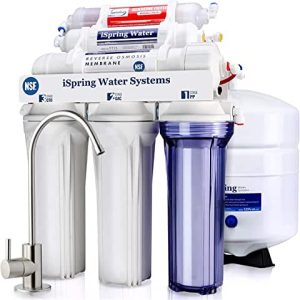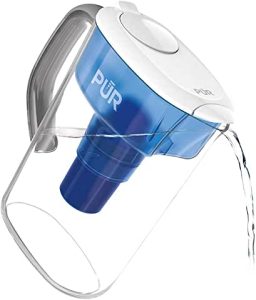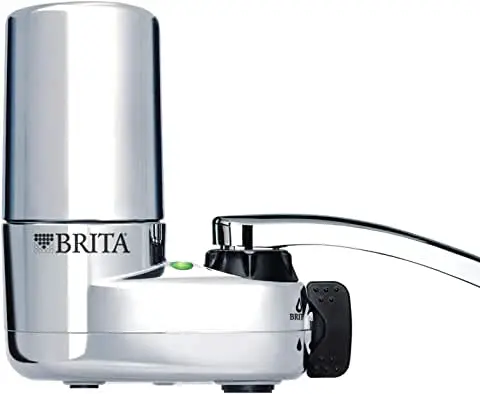Before you get water from your tap, it travels from its natural source through mountains, dirt, and rocks.
Bacteria, sediment, and other particles may be present in your water regardless of whether you draw it from a well or filter it. A bad smell or taste may be due to sulfur or iron, while other pollutants may go unnoticed.
Even though the contaminants are hard to see, that does not mean they are not in the water. Some chemicals that may be present in your water have the potential to be harmful to your health over time.
A house cannot exist without water. A water filter can help ensure that you and your loved ones get the water they deserve and need.
No products found.
More than merely better-tasting tap water, whole-house filters have numerous other benefits. It is possible to provide your entire home with clean, safe water with these modern filtering systems.
This means that the water you use to do your laundry, bathe, cook, brush your teeth, and clean is of a high standard of quality. You can also use filtered water from any of your home’s faucets by installing a whole-house model.
Before you begin the installation process, you should learn how to select the best system for your house.
Do You Know the Pollutants in Your Drinking Water?
Is the flavor, odor, or appearance of your water off? If that’s the case, it’s possible that pollutants are to blame. Pollutants can leave behind a metallic taste, smell, or residue in your water, depending on their level of visibility. Here are a few examples:
- Iron
- Total dissolved solids
- Sulfur
The senses cannot always identify all of the pollutants present in a given environment. Some pollutants might cause health issues if consumed for a lengthy period of time. Here are a few examples:
- Arsenic
- Perfluorooctanesulfonic acid (PFOS)
- Nitrates
- Lead
You can’t smell, taste, or see some toxins, so the only way to figure out what’s in your water is to have it tested. If any of the following applies, you should do a water test:
- The water you drink comes directly from your own private well.
- You’ve just recently relocated to a new house.
- The taste or odor of rotting eggs permeates your water.
No products found.
Water Filters: What Makes Them Work?
You can use different methods to remove impurities from the water, and each has its own advantages and drawbacks. One or more of the following concepts are used in these methods:
Physical barriers:
Physical barriers like distillation, sedimentation, and filtration help get rid of bigger particles from the water.
Biological barriers:
Biologically active carbons or slow sand filters are examples of biological barriers.
Chemical barriers:
Chlorination and flocculation methods make use of chemicals to get rid of water particles.
Electromagnetic radiation:
Physical filters can’t catch the tiny pollutants that ultraviolet light can. In addition, it can inactivate and eliminate germs.
No products found.
Factors to consider when purchasing a water filter
In order to make an informed decision about your choice of water filters, you need to know the nature of pollutants in your water.
In some locations, understanding the source of your water helps e.g. know whether you are using municipal water which is already treated or borehole water which may have challenges like salination. There are simple tips or tell tale signs on how to tell if you should purify your water.
To be able to select the right water filtration system, we recommend that you read credible reviews which are done by experts who have actually tested the various filtration equipment and how effective that equipment is in terms of purifying water from certain pollutants.
Some of the useful reviews that are features on Amazon include a review on the Best water filter done by TechGearLab, review of Best Water Pitchers and The Best Water Filter review done by The Spruce Eats.
The following are some things to keep in mind when purchasing a water filter:
No products found.
Identify Filtration’s Purpose
The flow rate and size of water filters vary widely. Some water filters are ideal for personal use at home, while others are better suited for the workplace. If you have one, it is simple to get a water filter that fits your full storage tank. The size of the water filter you need depends on how much water you consume on a daily basis.
Determine your preferred water filter
The sort of water filter you require depends on the toxins present in the water. Ask a specialist for help identifying some of the toxins in your water supply. You need a water filtration system if your water comes from the municipal system and contains minerals, sediments, chlorine, or chemicals.
You should hire an expert who can evaluate the water and then recommend the best water filter, depending on the findings of that analysis.

Recognize the Water Flow Rates of Your Home’s Different Appliances
Gallons per minute (GPM) is the unit of measurement for water flow. You should first check the manufacturer’s specifications for water dispensers before purchasing a water filter. The flow rate for a showerhead is about 3 gallons per minute.
On the flip side, toilets use three liters of water per minute. Think about the number of appliances in your house, the flow rate of each, and your family’s size before deciding on the ideal flow rate for your water filter.
The water pressure will be low, and the flow will be interrupted if you use a low-flow water filter.
Find out what’s in your water and take action
If you aren’t aware of what is in the water you use, it will be hard to choose an effective water filter. You can better plan your water filtration strategy when you know what chemicals are in your water. If you’re using municipal water, it’s possible to get regular updates on the chemical composition of your water.
You should test the water from a well for bacteria and microorganisms, especially from a private well. You can use a water testing kit to get a sense of the quality of the water. When you know what chemicals and contaminants are in your water, you can choose the best water filter for your needs.
No products found.
Power Source of the Water Filter
In most cases, you do not need power for most water filters. You also do not need additional electricity to run a gravity filter compared to counters, reverse osmosis, faucets, and other water purification methods that rely on water pressure to operate. A certain amount of water pressure is required by some of these systems in order for them to function properly.
Rate of Filtration
Depending on the water filter’s capacity, it is rated in gallons per minute that it can remove. Using a gravity pitcher water filter can take a long time to purify even a single glass of water, which can be annoying.
Water filters for the whole house or kitchen faucets will not operate with this method since they are too sluggish. Dishwashers and showers can use up to five gallons of water per minute. Therefore, whole-home filters need to be able to filter many more gallons per minute.

Water quality and pollutants
The city’s water treatment facility can’t catch all the hazardous substances that could make you sick.
An additional layer of purification is provided by home filtration systems, which remove a variety of pollutants, including pharmaceuticals, organic compounds, pesticides, and hazardous heavy metals like mercury and lead.
Some water filters can remove a few types of impurities, but not all. When purchasing a water filter, be aware of what toxins it can and can’t remove from the water.
Set up and maintenance of the water filter
Set up and maintenance of water filters might be difficult or simple. As opposed to a faucet filter, a reverse osmosis system may necessitate a more complex process. Simple plumbing expertise is all that you need to install most water filters.
Changing a water filter’s filters on a regular basis is an essential part of water filter maintenance, and most systems make the process easy. The complexity of a system affects its price.
Some of the purest water you can drink comes from reverse osmosis systems with seven filtration stages, but the cost of replacing all seven filters can add up rapidly.
Conclusion on Water Filters
In the event that you’re in the market for a new water filter system because your old one broke down, following the advice provided here will help you make an informed decision.
Verify the certification and approval of the water filter. To pick the best system for your home, you must also consider the quality of the water.

